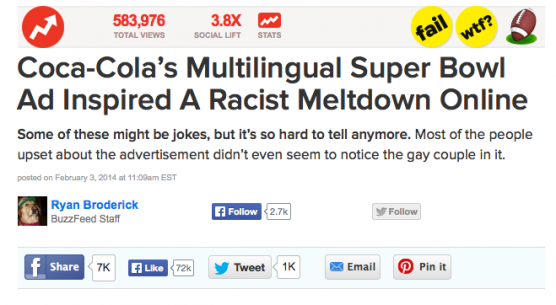Hi Ryan, it's Sean! It's nice to finally meet you here, since you haven't replied to any of my queries via Twitter. That's understandable, as you must be busy - what with all of the shibe memes to comb through and "Snapchat selfies" to compile. After all, the next big BuzzFeed post doesn't write itself! [It does write itself. - Ed.]
Anyway, you seem like a pleasant enough guy. In a parallel universe, right at this moment, we might find ourselves bellied up to the very same bar, sipping whiskey or beer and talking about our beloved Red Sox. (Which Will Middlebrooks do you think shows up this Spring? The 2012 version or the 2013?)
However, we live in this universe. It's the one in which you painted me as racist in front of a half-million people.
It all started innocently enough. You see, the Super Bowl presents an irresistible opportunity for professional comedians and armchair smart-asses like myself. The annual event grants us a precious few hours to poke fun at something while EVERYONE is watching, a rare commodity at a time when the mass media audience is increasingly fractured into smaller subsets.
This shared viewing experience makes for an unusually fertile environment for material to go viral. Of course, you're already familiar with this, since the timely delivery of highly-shareable content is BuzzFeed's entire modus operandi.
Let's flash back to several days before the game: After learning that a Cheerios ad (portraying an interracial family) might be expected to draw some controversy upon airing - as a similar ad did in May - I was disgusted. Nothing could seem more innocuous than the depiction of a loving Mom, Dad, child, and child to-be, notwithstanding their apparent preference for bland breakfast cereal.
Later, when Coca-Cola's multilingual ad (featuring "America the Beautiful" sung in a panoply of non-English tongues) aired in-game, not long after the Cheerios ad, I knew the spot might further catapult the most-vocal of our country's xenophobic fringe into a frothing-mad state. You know, the same folks who think having to "press '1' for English" should be a Constitutional matter. The card-carrying members of "'they took our jobs’/birther/'thanks Obama’/'Merica" America. Those whose contributions to our political discourse have become shrill self-caricatures. The sort of people who are almost too easy to ridicule.
Almost.
So, I tweeted:
"@seanfrederick: Coca-Cola and Cheerios have been absolutely disgraceful tonight. #speakamerican #Benghazi"
2/2/14 7:51 PM
The tweet garnered a few meager laughs and favorites from my followers, who clearly got the joke. In the upper-right hand corner of the country, "Speak American!" is a pretty obvious (if hackneyed) punchline. And, using the #Benghazi hashtag, as comedian Rob Delaney does to over 1 million followers on a regular basis, is another wink to the audience that's become a well-established Twitter trope. My tweet wasn't particularly novel satire, but it was indeed just that - satire - and you don't have to be a pointy-headed Northeastern liberal to realize that I'm breaking the fourth wall.
So, much to my chagrin, I awoke the next morning to find my middling, throwaway tweet included in your BuzzFeed post, "Coca-Cola’s Multilingual Super Bowl Ad Inspired A Racist Meltdown Online"
I made fun of racists. In turn, you characterized me as one, to a readership of 583,976 and counting.
There I was. My face and name repeatedly listed side-by-side with real, honest-to-goodness racists. For the past two days and nights, I've been lambasted by your readership and their Twitter followers, who've taken to me with virtual pitchforks in a misdirected burst of internet vigilantism. It's become burdensome to reply to all of them, which I've since ceased doing.
Why? Because they're not the problem. You are.
This piece was lazily pasted-together outrage-bait, pure and simple. You devoted a few minutes to searching for and pulling block quotes from a small, but reprehensible handful of Twitter bigots, padding the material not once, not twice, but THREE times with my one satirical item in order to mound the material into something that appeared to be an enormous groundswell of ravings, slapped a provocative headline on it, and fed it to an audience sure to seize upon the red meat with clicks, likes, combative comments, retweets, and shares.
By traditional reporting standards, your recklessness would be cause for dismissal. But, by BuzzFeed standards, you've excelled.
As BuzzFeed's CEO Jonah Peretti told Adweek what he looks for in employees: "People who really understand how information is shared on Twitter and Facebook and Instagram and other emerging platforms, because that is in some cases as important as, you know, having traditional reporting talent."
Unfortunately for you, the old media legal system still applies to new media, no matter how much "social lift" a story gets. And we're destined to explore some costly ground should my name and likeness not be struck from your original post.
My grievances are less about an few inconvenienced days and more about my reputation for the next decade. A Twitter firestorm can blow over, but Google search indexing doesn't relent so easily. It’s not a stretch to imagine your BuzzFeed post will be featured prominently amongst a Google query for "Sean Frederick", given that it's garnered a half-million pageviews and mention of the article is incessantly cross-linking to my Twitter profile.
"Contributor to racist meltdown", is not a title I will tolerate, not when one's current and future business opportunities, prospective employers, and personal reputation are often shaped by a cursory Google search.
So, this notice - however informally delivered - stands as very formal demand for retraction of any mention of my name, likeness, or quotations from the BuzzFeed post in question.
I hope for the both of us that it's the last request I have to make, as I'm presenting you a very easy out. Should you not acquiesce, your road gets much harder.
I maintain legal residence in the State of New Hampshire, which allows false light claims to be brought against media defendants. In case you need brushing up, this invasion of privacy bears a lower burden of proof than outright defamation - it occurs merely when a publication places the plaintiff in a false light that a reasonable person would find embarrassing.
The last landmark case in New Hampshire took 5 years to adjudicate, nearly costing a New York Times reporter (not her employer, I might add) over $400,000. That was before Twitter. Before such embarrassment could be quantified. Today, one could expect litigation to slog onward in just as costly and lengthy a process. You could not, however, have an expectation that a New Hampshire court would rule in your favor.
You don’t want to go to court. I’m sure your girlfriend wouldn't want you to.
Frankly, I don’t either, but make no mistake: I'm fully prepared to, if you give me no other choice.
You’ve gotten your pageviews. Now give me back my name, please.
Sincerely,
Sean Frederick

















Comments
TC replied on Permalink
BuzzFeed's Ryan
It all a personal thing what I don’t care about so good luck hope you can sort the out